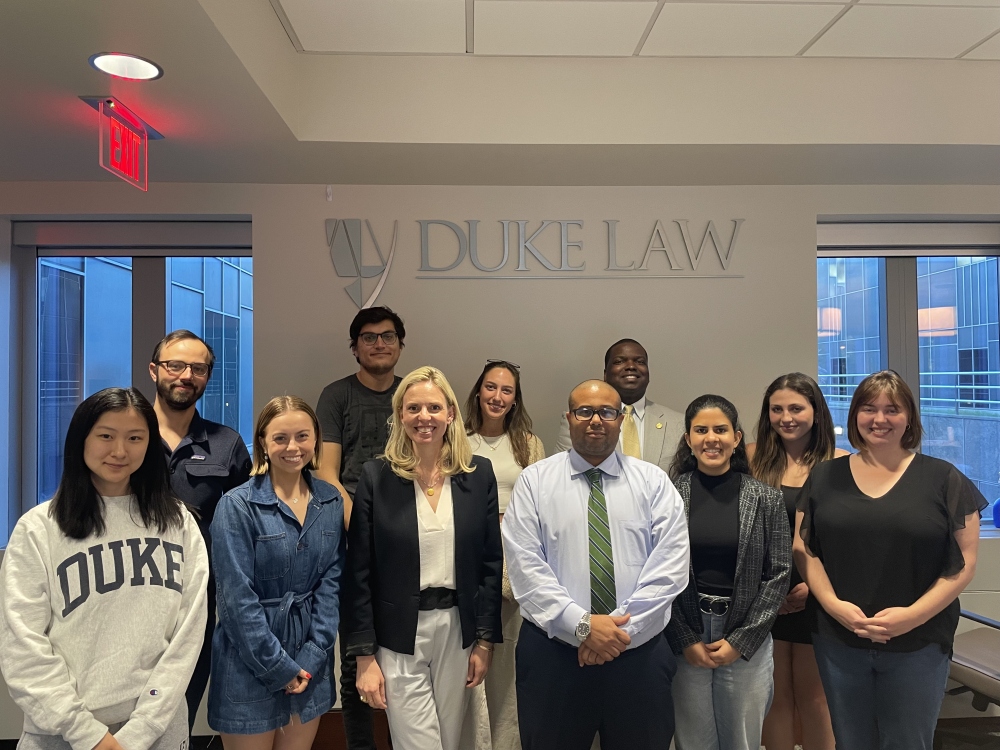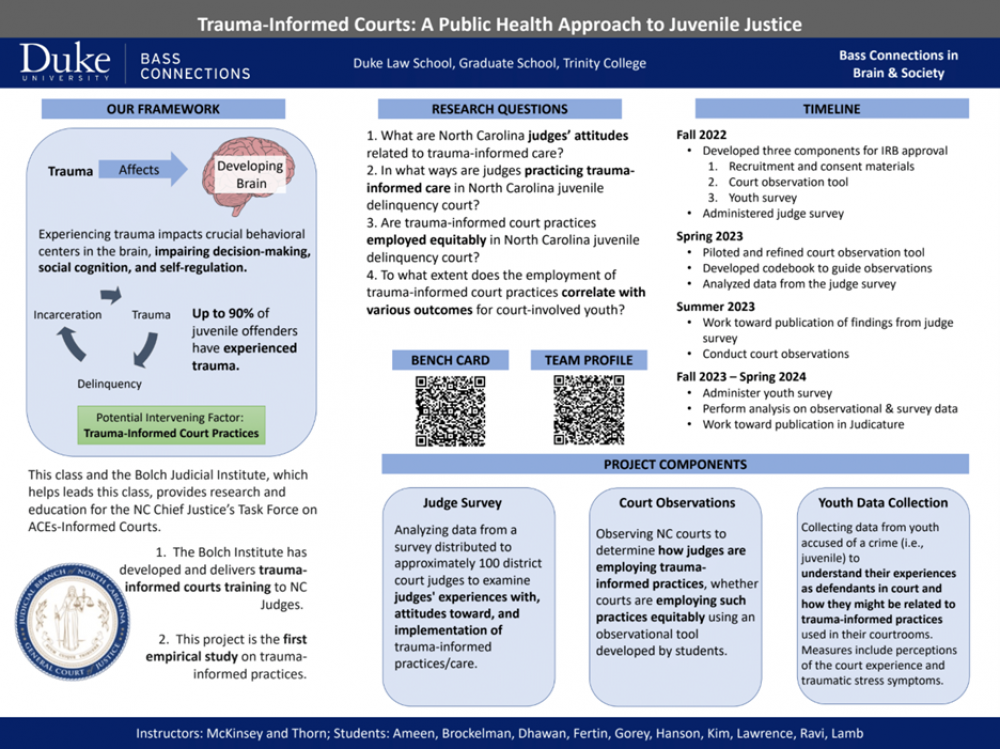Trauma-Informed Practices in North Carolina Courtrooms
Project Team

Trauma-Informed Courts: A Public Health Approach to Juvenile Justice
Team profile by Sam Lawrence and Sid Ravi
In the 1990s, Kaiser Permanente asked over 17,000 people about their “adverse childhood experiences” (ACEs). Researchers were astounded by the results—not only was trauma more prevalent than expected, but there was also a clear association between ACEs and adverse health outcomes. This research led to developments across disciplines, causing caretakers, teachers, social workers and others to acknowledge and respond to trauma.
The impacts of trauma are particularly relevant in the criminal legal system. Research shows that trauma can impact brain and body development in ways that alter a person’s fear responses, decision-making skills and perceptions of the world around them. Trauma can make it more likely for a person to be involved in the criminal legal system, and failure to treat trauma can make it more difficult to exit the system. Research also shows that involvement in the criminal legal system can traumatize, or re-traumatize, some people. For all these reasons, stakeholders increasingly acknowledge that trauma-informed practice in the courts can lead to better outcomes for people in the criminal legal system.
North Carolina is leading the way in this movement. In May 2021, Chief Justice Paul Newby created the Chief Justice’s Task Force on ACEs-Informed Courts. Shortly thereafter, the Bolch Judicial Institute at Duke Law, the academic leader of the task force, developed and delivered a pilot educational program for judges on childhood trauma. An article published by the Bolch Institute summarizes the pilot and judges’ feedback to the program. The Bolch Institute, along with other task force members, also authored a bench card for judges to keep on hand during hearings that recommends the use of specific trauma-informed practices. The bench card has been widely distributed to judicial administrators across the state, as well as to some branches of law enforcement.
Many judges in the pilot program also posed a much bigger question: Do trauma-informed practices positively impact court-involved people? Judges tell us they would more likely adopt such practices, and encourage their colleagues to do the same, if they could be armed with these data. Our Bass Connections team was created to investigate this question, specifically focusing on juvenile delinquency court.
Our team’s main research questions are:
- What are North Carolina judges’ attitudes related to trauma-informed care?
- In what ways are judges practicing trauma-informed care in North Carolina juvenile delinquency court?
- Are trauma-informed court practices employed equitably in North Carolina juvenile delinquency court?
- To what extent does the employment of trauma-informed court practices correlate with various outcomes for court-involved youth?
Our team consists of students across Duke, including undergraduate students, law students, master in interdisciplinary data science students and bioethics and policy students. Amelia Thorn, a law professor and an assistant director at the Bolch Judicial Institute who also serves on the Chief Justice’s Task Force and Dr. Eva McKinsey, a social and community psychologist who has focused her work on trauma-informed practices, have led us in our research. Team members met regularly to explore broader topics in the brain science of trauma and judicial practice, and heard from judges, court administrators, district attorneys, public defenders, psychologists and social workers from around the state. We also worked in sub-teams to develop expertise in particular areas and propel certain projects forward.
Our research has included three main components: 1) a survey of North Carolina district court judges on attitudes regarding trauma; 2) court observations in North Carolina juvenile delinquency courts; and 3) data collection from court-involved youth.
Judge Survey
In Fall 2022, we surveyed North Carolina district court judges, asking them about their experience with trauma education, attitudes toward trauma-informed care and implementation of specific trauma-informed practices. The survey was administered to approximately 100 district court judges, most of whom are currently or were previously sitting in juvenile delinquency court.
In Spring 2023, a sub-team worked on understanding the data from the judge survey. The team began by conducting a literature review and understanding the theory animating the survey. They familiarized themselves with the validated scales included in the survey, learned the basics of R Studio (a statistical analysis tool) and developed research questions. The team is currently analyzing data from the survey and writing a manuscript to report findings.
Court Observations
In Fall 2022, a sub-team worked to develop an observational instrument to track trauma-informed practices in courts. The team reviewed literature on such practices as well as on ways to observe them in court. The full project team worked tirelessly throughout the year to improve the measurement items and streamline the format for easy in-court use. In Spring 2023, all team members traveled throughout the state to observe juvenile delinquency courts in action, piloting and iteratively improving the instrument as we went. The team also engaged in consensus coding, a post-observation process in which observers discussed their findings and noted discrepancies.
Judge J.H. Corpening II, chief district court judge in New Hanover and Pender Counties, graciously allowed our team to observe court during the very first pilot of the observational instrument. A large portion of the class traveled to Wilmington, North Carolina to observe Judge Corpening’s court, and subsequently engaged in a roundtable discussion with Judge Corpening and Ben David, head district attorney for New Hanover and Pender Counties.
“It was a pleasure hosting Duke students in my courtroom this year to observe court,” Corpening said. “In our discussions following their observation, they were passionate, inquisitive and thoughtful.”
Data Collection from Court-Involved Youth
Finally, the team has prepared to survey youth involved in the court system as juveniles about their experiences in court to better understand how those experiences might be related to the trauma-informed practices used in their courtrooms.
In Fall 2022, a sub-team developed a survey to measure youth wellbeing and perceptions before and after their court experience. The team conducted a literature review to understand the impact of trauma-informed care beyond the court setting and gathered measures that evaluate traumatic stress symptoms, child wellbeing and perceptions of procedural justice. The survey was drafted with a clear eye toward reading comprehension among young people and to the challenges and ethical constraints of interacting with young people in the system.
2023–2024 Academic Year
The Bass Connections team is proud to welcome back 100% of non-graduating 2022-2023 team members for the 2023-2024 academic year, and to add several new students as well. This group will continue to observe court throughout the state and will begin to administer the survey for court-involved youth. Team members will also begin to publish findings on the judge survey and the court observation data.
The Bass Connections experience is unlike any other, both for undergraduate participants new to research as well as for graduate team members poised to take on important leadership roles. This Bass Connections project team in particular afforded students a rare importunity to design a study from the very start and to create from scratch the tools that would help direct the research.
Sid Ravi, an undergraduate at Trinity College studying economics, called the project “very meaningful.” “To be doing research about such an understudied aspect of juvenile justice while also doing real world research to help young people across the state is so important,” he said. “It also helps to contextualize classroom learning. I am so grateful for everyone on this team and the amazing work we have done this year.”
The promise of the class’s work is exciting not just to students, but to legal leaders in the North Carolina community as well.
“The research being done as part of Duke’s Bass Connections program will allow judges to better understand trauma-informed practices, hopefully inspiring even more judges to adopt these measures in their own courtrooms,” said Corpening. “Those who serve in juvenile delinquency court in particular will benefit, but the work, especially the judicial survey, will also give us a broader sense of whether and how certain trauma approaches are currently in use. That can help inform future educational efforts as well.”
Trauma-Informed Courts: A Public Health Approach to Juvenile Justice
Poster by Eva McKinsey, Amelia Thorn, Cassandra Ameen, Nina Brockelman, Ebani Dhawan, Mary Fertin, Catherine Gorey, Kaitlyn Hanson, Minjee Kim, Samuel Lawrence, Sidharth Ravi and Raza Lamb

